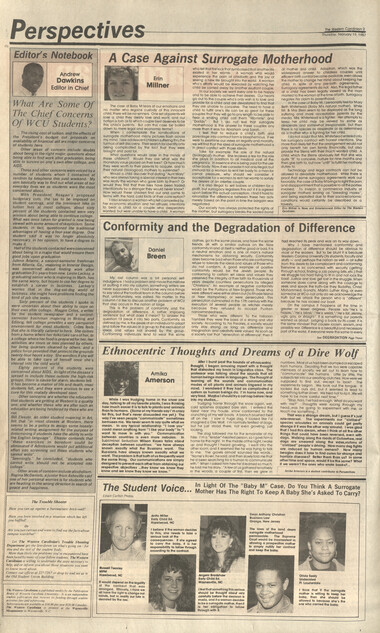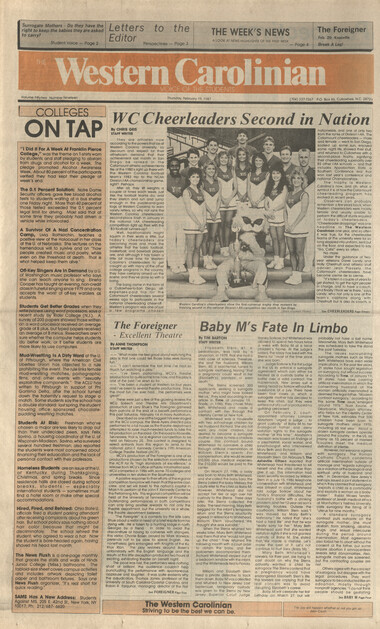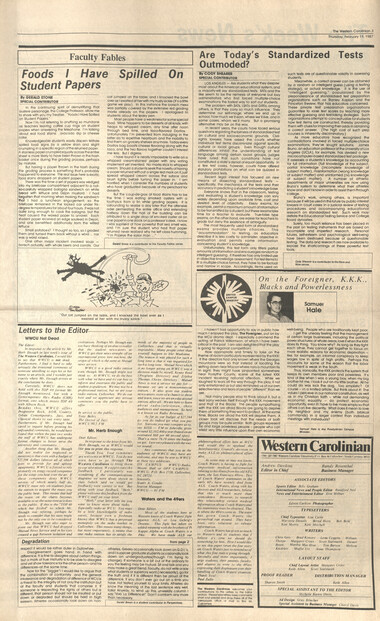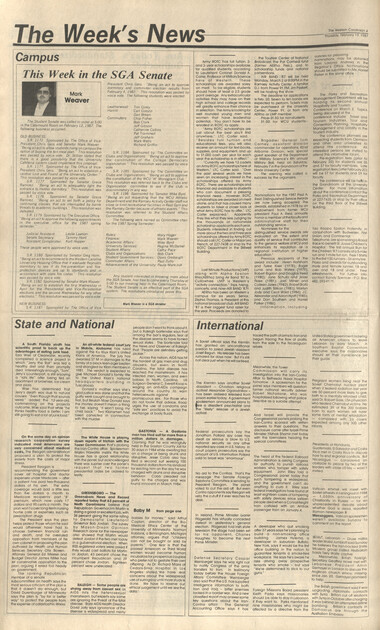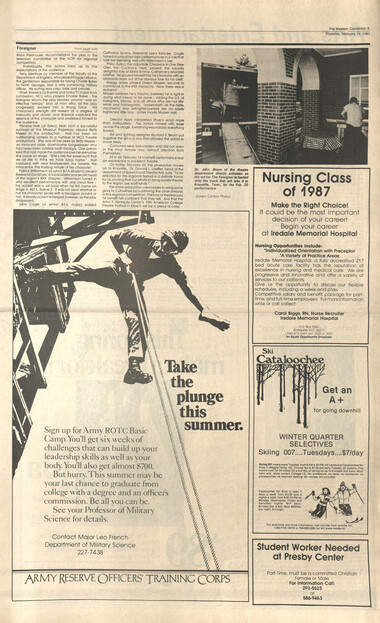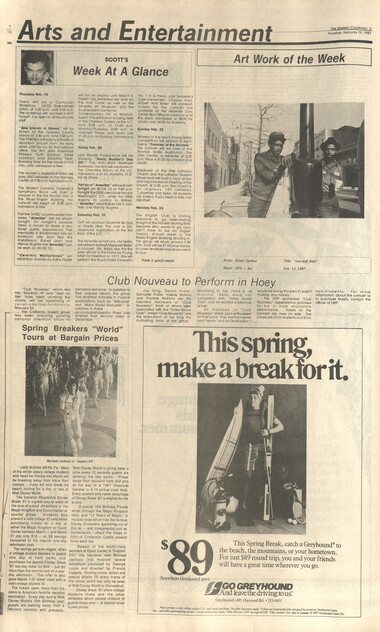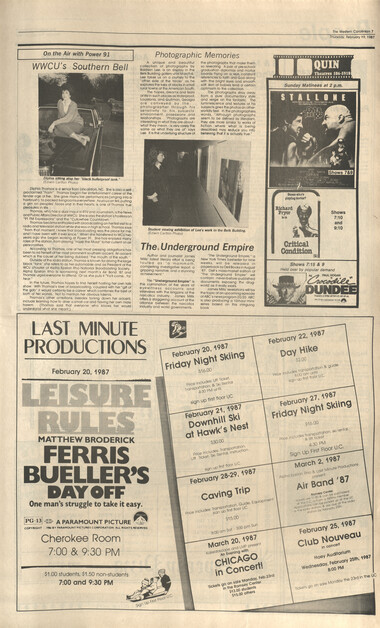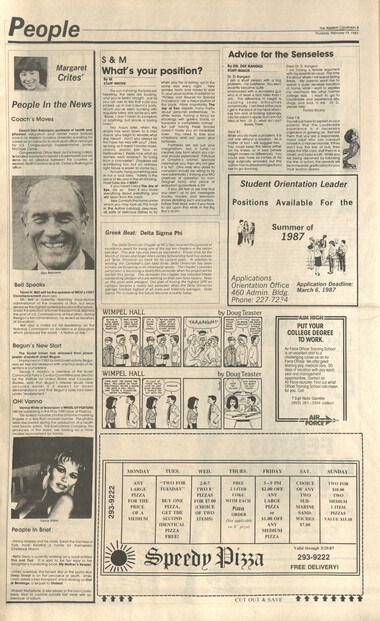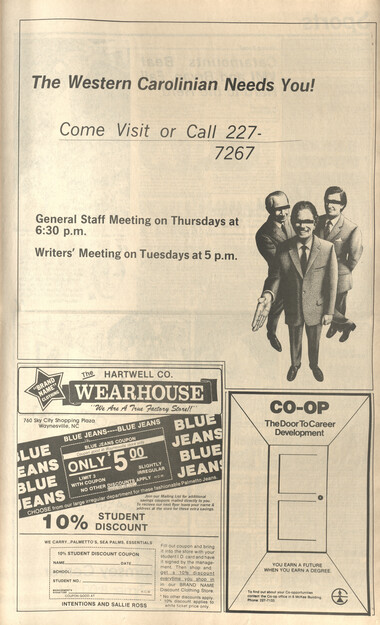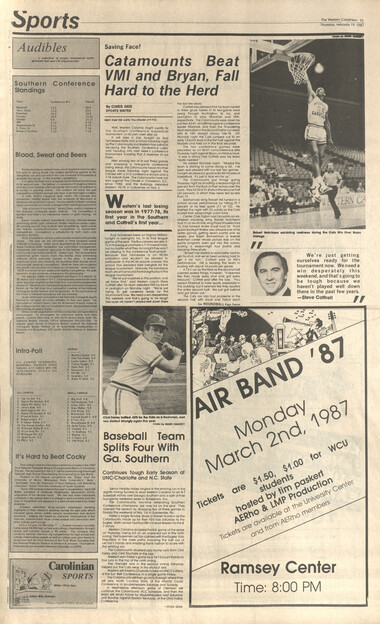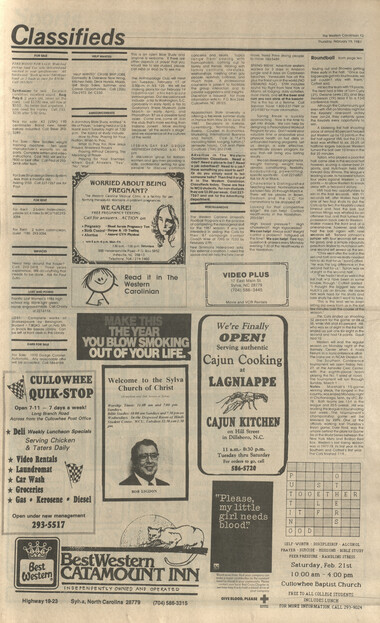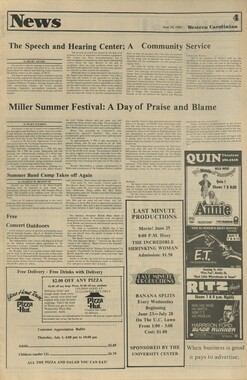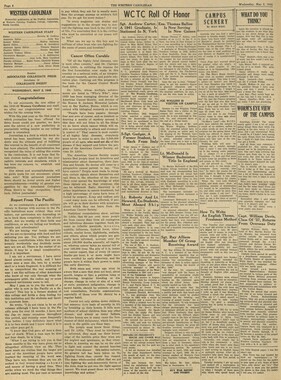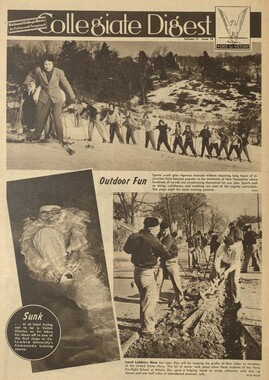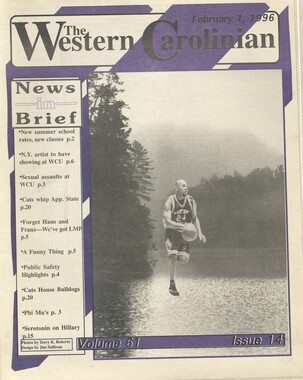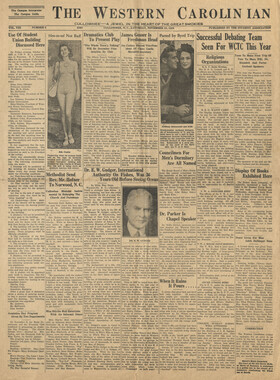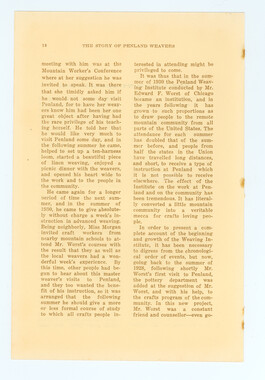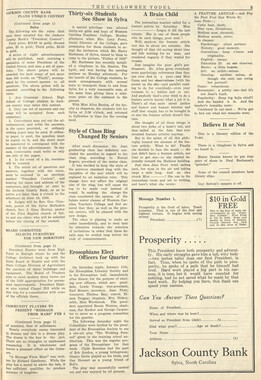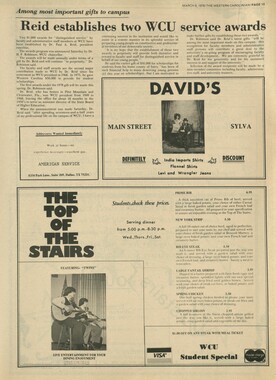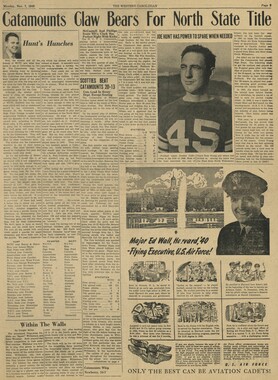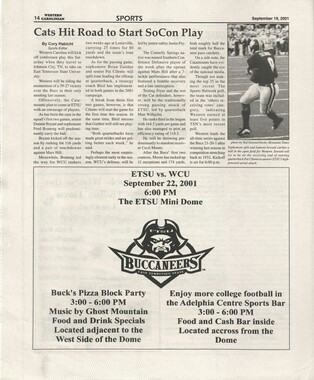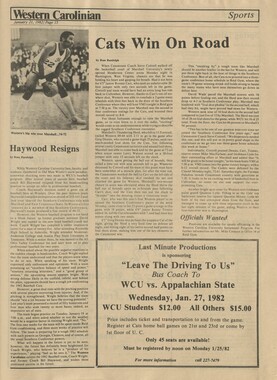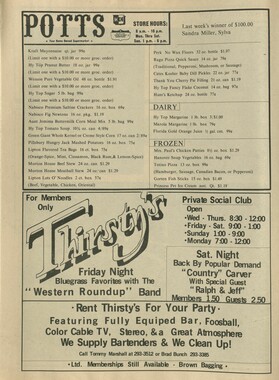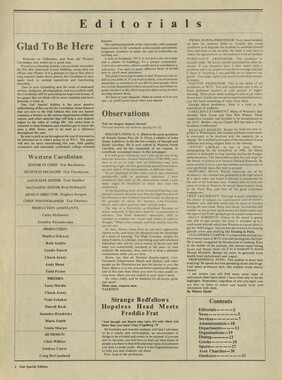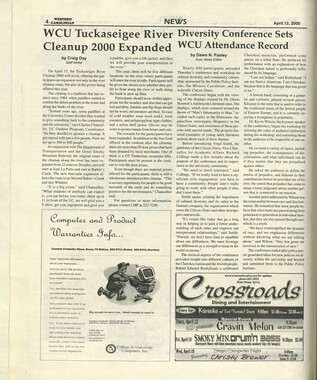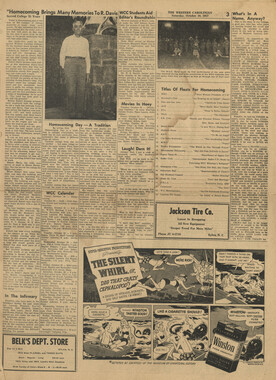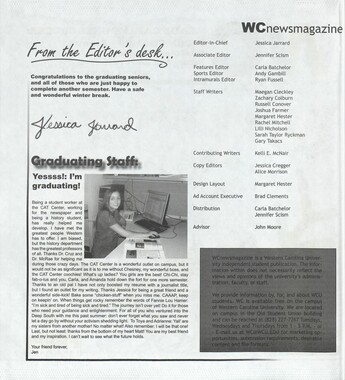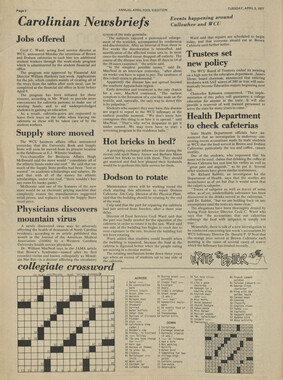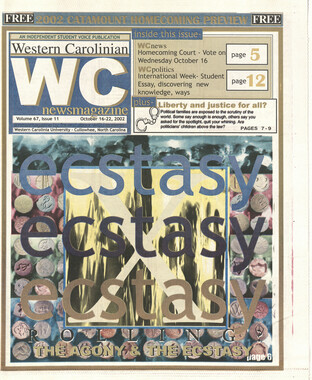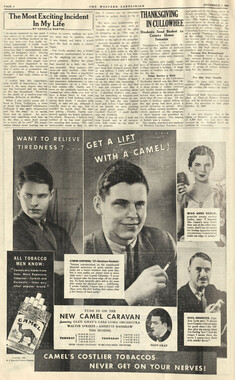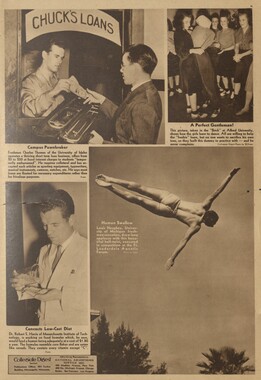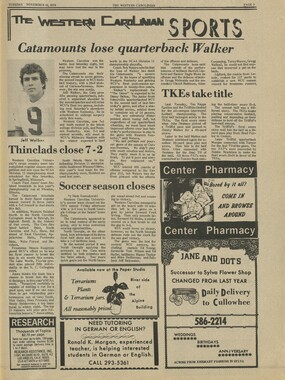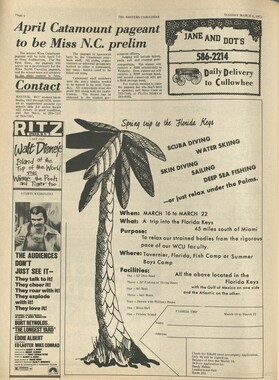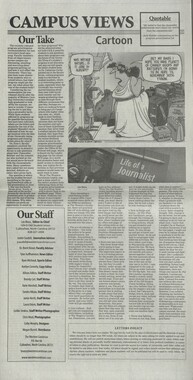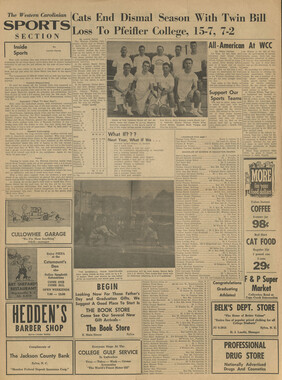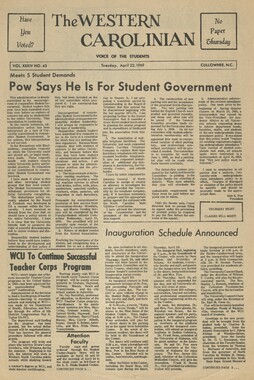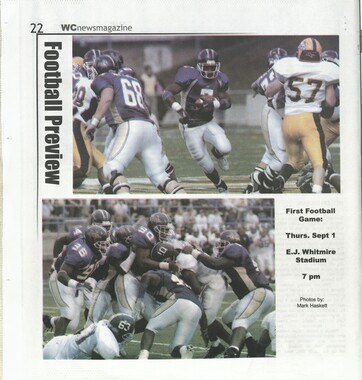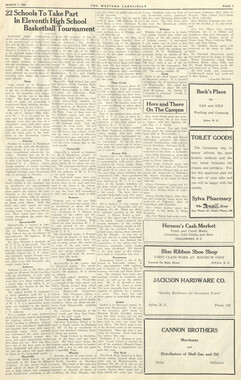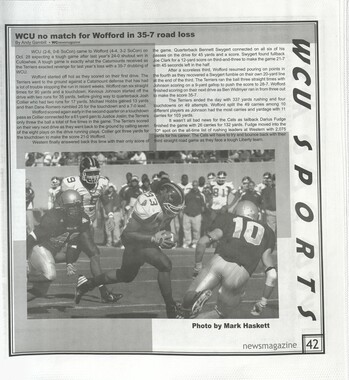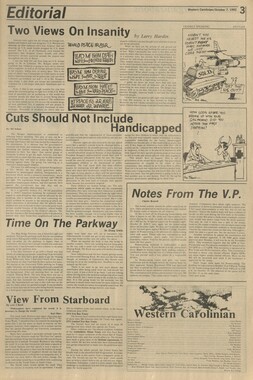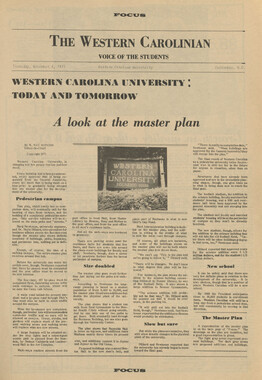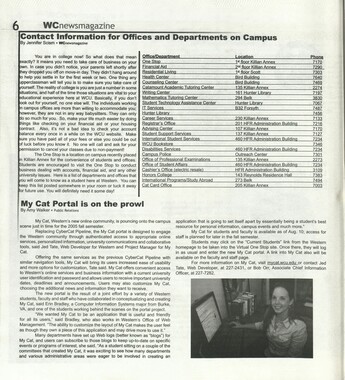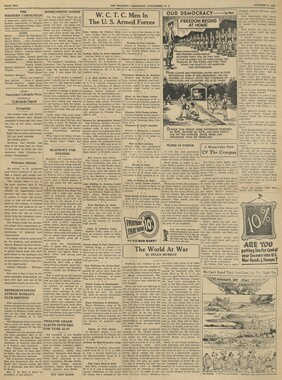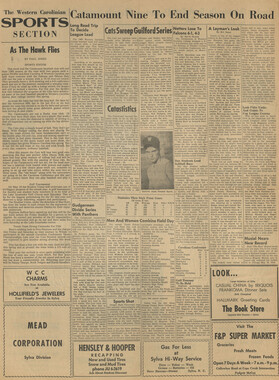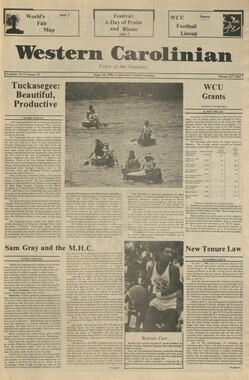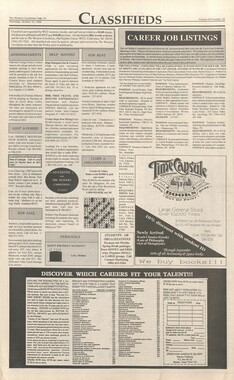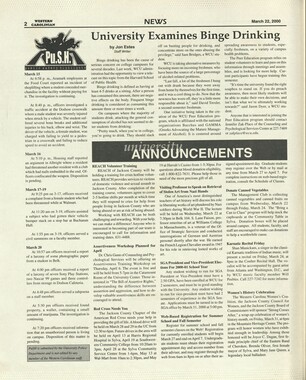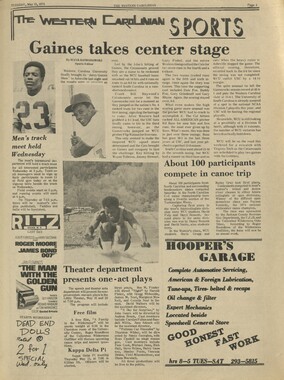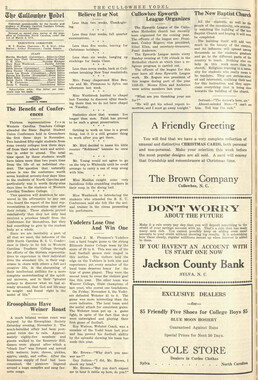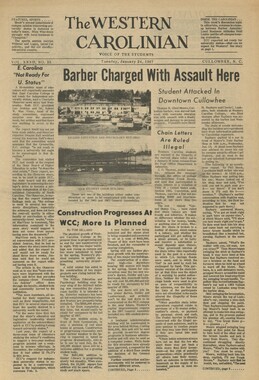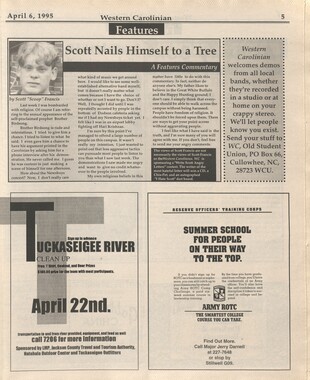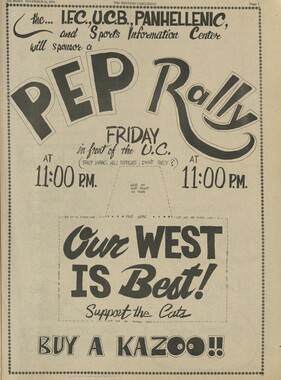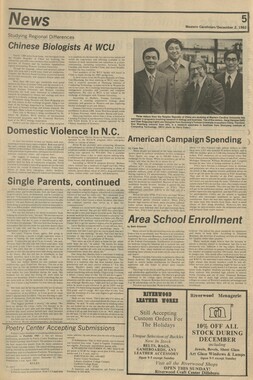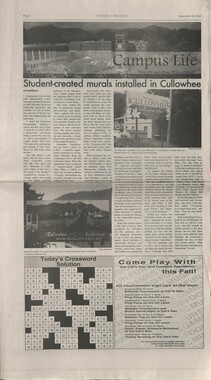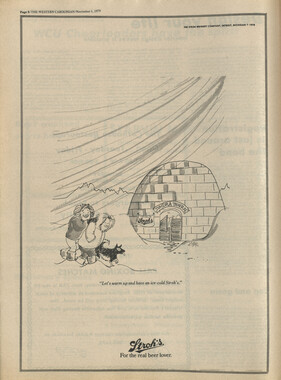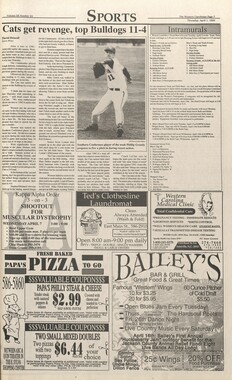Western Carolina University (21)
View all
- Canton Champion Fibre Company (2308)
- Cherokee Traditions (291)
- Civil War in Southern Appalachia (165)
- Craft Revival (1942)
- George Masa Collection (137)
- Great Smoky Mountains - A Park for America (3080)
- Highlights from Western Carolina University (422)
- Horace Kephart (973)
- Journeys Through Jackson (159)
- LGBTQIA+ Archive of Jackson County (89)
- Oral Histories of Western North Carolina (318)
- Picturing Appalachia (6617)
- Stories of Mountain Folk (413)
- Travel Western North Carolina (153)
- Western Carolina University Fine Art Museum Vitreograph Collection (129)
- Western Carolina University Herbarium (92)
- Western Carolina University: Making Memories (738)
- Western Carolina University Publications (2491)
- Western Carolina University Restricted Electronic Theses and Dissertations (146)
- Western North Carolina Regional Maps (71)
- World War II in Southern Appalachia (131)
University of North Carolina Asheville (6)
View all
- Allanstand Cottage Industries (62)
- Appalachian National Park Association (53)
- Bennett, Kelly, 1890-1974 (1463)
- Berry, Walter (76)
- Brasstown Carvers (40)
- Carver, George Washington, 1864?-1943 (26)
- Cathey, Joseph, 1803-1874 (1)
- Champion Fibre Company (233)
- Champion Paper and Fibre Company (297)
- Cherokee Indian Fair Association (16)
- Cherokee Language Program (22)
- Crowe, Amanda (40)
- Edmonston, Thomas Benton, 1842-1907 (7)
- Ensley, A. L. (Abraham Lincoln), 1865-1948 (275)
- Fromer, Irving Rhodes, 1913-1994 (70)
- George Butz (BFS 1907) (46)
- Goodrich, Frances Louisa (120)
- Grant, George Alexander, 1891-1964 (96)
- Heard, Marian Gladys (60)
- Kephart, Calvin, 1883-1969 (15)
- Kephart, Horace, 1862-1931 (313)
- Kephart, Laura, 1862-1954 (67)
- Laney, Gideon Thomas, 1889-1976 (439)
- Masa, George, 1881-1933 (61)
- McElhinney, William Julian, 1896-1953 (44)
- Niggli, Josephina, 1910-1983 (10)
- North Carolina Park Commission (105)
- Osborne, Kezia Stradley (9)
- Owens, Samuel Robert, 1918-1995 (11)
- Penland Weavers and Potters (36)
- Roberts, Vivienne (15)
- Roth, Albert, 1890-1974 (142)
- Schenck, Carl Alwin, 1868-1955 (1)
- Sherrill's Photography Studio (2565)
- Southern Highland Handicraft Guild (127)
- Southern Highlanders, Inc. (71)
- Stalcup, Jesse Bryson (46)
- Stearns, I. K. (213)
- Thompson, James Edward, 1880-1976 (226)
- United States. Indian Arts and Crafts Board (130)
- USFS (683)
- Vance, Zebulon Baird, 1830-1894 (1)
- Weaver, Zebulon, 1872-1948 (58)
- Western Carolina College (230)
- Western Carolina Teachers College (282)
- Western Carolina University (2008)
- Western Carolina University. Mountain Heritage Center (18)
- Whitman, Walt, 1819-1892 (10)
- Wilburn, Hiram Coleman, 1880-1967 (73)
- Williams, Isadora (3)
- Cain, Doreyl Ammons (0)
- Crittenden, Lorraine (0)
- Rhodes, Judy (0)
- Smith, Edward Clark (0)
- Appalachian Region, Southern (3032)
- Asheville (N.C.) (1945)
- Avery County (N.C.) (26)
- Blount County (Tenn.) (195)
- Buncombe County (N.C.) (1680)
- Cherokee County (N.C.) (283)
- Clay County (N.C.) (556)
- Graham County (N.C.) (238)
- Great Smoky Mountains National Park (N.C. and Tenn.) (525)
- Haywood County (N.C.) (3573)
- Henderson County (N.C.) (70)
- Jackson County (N.C.) (4925)
- Knox County (Tenn.) (35)
- Knoxville (Tenn.) (13)
- Lake Santeetlah (N.C.) (10)
- Macon County (N.C.) (421)
- Madison County (N.C.) (216)
- McDowell County (N.C.) (39)
- Mitchell County (N.C.) (135)
- Polk County (N.C.) (35)
- Qualla Boundary (982)
- Rutherford County (N.C.) (78)
- Swain County (N.C.) (2185)
- Transylvania County (N.C.) (270)
- Watauga County (N.C.) (12)
- Waynesville (N.C.) (86)
- Yancey County (N.C.) (72)
- Aerial Photographs (3)
- Aerial Views (60)
- Albums (books) (4)
- Articles (1)
- Artifacts (object Genre) (228)
- Bibliographies (1)
- Biography (general Genre) (2)
- Cards (information Artifacts) (38)
- Clippings (information Artifacts) (192)
- Copybooks (instructional Materials) (3)
- Crafts (art Genres) (622)
- Depictions (visual Works) (21)
- Design Drawings (1)
- Digital Moving Image Formats (2)
- Drawings (visual Works) (185)
- Envelopes (101)
- Exhibitions (events) (1)
- Facsimiles (reproductions) (1)
- Fiction (general Genre) (4)
- Financial Records (12)
- Fliers (printed Matter) (67)
- Glass Plate Negatives (381)
- Guidebooks (2)
- Internegatives (10)
- Interviews (823)
- Land Surveys (102)
- Letters (correspondence) (1045)
- Manuscripts (documents) (618)
- Maps (documents) (177)
- Memorandums (25)
- Minutes (administrative Records) (59)
- Negatives (photographs) (6090)
- Newsletters (1290)
- Newspapers (2)
- Notebooks (8)
- Occupation Currency (1)
- Paintings (visual Works) (1)
- Pen And Ink Drawings (1)
- Periodicals (194)
- Personal Narratives (10)
- Photographs (12977)
- Plans (maps) (1)
- Poetry (6)
- Portraits (4568)
- Postcards (329)
- Programs (documents) (181)
- Publications (documents) (2444)
- Questionnaires (65)
- Relief Prints (26)
- Sayings (literary Genre) (1)
- Scrapbooks (282)
- Sheet Music (2)
- Slides (photographs) (402)
- Songs (musical Compositions) (2)
- Sound Recordings (802)
- Specimens (92)
- Speeches (documents) (18)
- Tintypes (photographs) (8)
- Transcripts (329)
- Text Messages (0)
- A.L. Ensley Collection (275)
- Appalachian Industrial School Records (7)
- Appalachian National Park Association Records (336)
- Axley-Meroney Collection (2)
- Bayard Wootten Photograph Collection (20)
- Bethel Rural Community Organization Collection (7)
- Blumer Collection (5)
- C.W. Slagle Collection (20)
- Canton Area Historical Museum (2110)
- Carlos C. Campbell Collection (462)
- Cataloochee History Project (64)
- Cherokee Studies Collection (4)
- Daisy Dame Photograph Album (5)
- Daniel Boone VI Collection (1)
- Doris Ulmann Photograph Collection (112)
- Elizabeth H. Lasley Collection (1)
- Elizabeth Woolworth Szold Fleharty Collection (4)
- Frank Fry Collection (95)
- George Masa Collection (173)
- Gideon Laney Collection (452)
- Hazel Scarborough Collection (2)
- Hiram C. Wilburn Papers (28)
- Historic Photographs Collection (236)
- Horace Kephart Collection (861)
- Humbard Collection (33)
- Hunter and Weaver Families Collection (1)
- I. D. Blumenthal Collection (4)
- Isadora Williams Collection (4)
- Jesse Bryson Stalcup Collection (47)
- Jim Thompson Collection (224)
- John B. Battle Collection (7)
- John C. Campbell Folk School Records (80)
- John Parris Collection (6)
- Judaculla Rock project (2)
- Kelly Bennett Collection (1482)
- Love Family Papers (11)
- Major Wiley Parris Civil War Letters (3)
- Map Collection (12)
- McFee-Misemer Civil War Letters (34)
- Mountain Heritage Center Collection (4)
- Norburn - Robertson - Thomson Families Collection (44)
- Pauline Hood Collection (7)
- Pre-Guild Collection (2)
- Qualla Arts and Crafts Mutual Collection (12)
- R.A. Romanes Collection (681)
- Rosser H. Taylor Collection (1)
- Samuel Robert Owens Collection (94)
- Sara Madison Collection (144)
- Sherrill Studio Photo Collection (2558)
- Smoky Mountains Hiking Club Collection (616)
- Stories of Mountain Folk - Radio Programs (374)
- The Reporter, Western Carolina University (510)
- Venoy and Elizabeth Reed Collection (16)
- WCU Gender and Sexuality Oral History Project (36)
- WCU Mountain Heritage Center Oral Histories (25)
- WCU Oral History Collection - Mountain People, Mountain Lives (71)
- WCU Students Newspapers Collection (1923)
- Western North Carolina Tomorrow Black Oral History Project (69)
- William Williams Stringfield Collection (2)
- Zebulon Weaver Collection (109)
- African Americans (390)
- Appalachian Trail (35)
- Artisans (521)
- Cherokee art (84)
- Cherokee artists -- North Carolina (10)
- Cherokee language (21)
- Cherokee pottery (101)
- Cherokee women (208)
- Church buildings (190)
- Civilian Conservation Corps (U.S.) (111)
- College student newspapers and periodicals (2012)
- Dams (108)
- Dance (1023)
- Education (222)
- Floods (63)
- Folk music (1015)
- Forced removal, 1813-1903 (2)
- Forest conservation (220)
- Forests and forestry (1198)
- Gender nonconformity (4)
- Great Smoky Mountains National Park (N.C. and Tenn.) (181)
- Hunting (47)
- Landscape photography (25)
- Logging (122)
- Maps (83)
- Mines and mineral resources (9)
- North Carolina -- Maps (18)
- Paper industry (38)
- Postcards (255)
- Pottery (135)
- Railroad trains (72)
- Rural electrification -- North Carolina, Western (3)
- School integration -- Southern States (2)
- Segregation -- North Carolina, Western (5)
- Slavery (5)
- Sports (452)
- Storytelling (243)
- Waterfalls -- Great Smoky Mountains (N.C. and Tenn.) (66)
- Weaving -- Appalachian Region, Southern (280)
- Wood-carving -- Appalachian Region, Southern (328)
- World War, 1939-1945 (173)
Western Carolinian Volume 52 Number 19
Item
Item’s are ‘child’ level descriptions to ‘parent’ objects, (e.g. one page of a whole book).
-
-
Perspectives The Western Carojinian 2 Thursday, February 19,1987 Editor's Notebook Andrew Dawkins Editor in Chief What Are Some Of The Chief Concerns Of WCU Students? The rising cost of tuition, and the effects of the President's budget cut proposals on availability of financial aid are major concerns of students here. Other areas of concern include doubts about being in the right major, questions about being able to find work after graduation, being able to survive on one's own after college, and AIDS. These and other concerns were voiced by a number of students whom I contacted at random by telephone this past weekend. My aim basically was to find out what areas of our everyday lives we as students were the most concerned about. With President Reagan's proposed budgetary cuts, the tax to be imposed on student earnings, and the imminent hike in tuition fees at most colleges, about sixty percent of the students contacted were very anxious about being able to continue college. What was once taken for granted is now being viewed with some amount of skepticism. Some students, in fact, questioned the traditional advantages of having a four-year degree. One student said it was no longer absolutely necessary, in her opinion, to have a degree to make it. Half of the students contacted wereconcerned about being in a major that would ensure them good jobs upon graduation. Julene Adams, a second-semester freshman from Atlanta, Ga., majoring in Interior Design, was concerned about finding work after graduation 3:/z years from now. Leslie Lackey, a graduating senior who is majoring in Math, has the same worry, but hopes to use her degree to establish a career in business. Lackey's worries that in the dog-eat-dog world of business, she might have problems finding the kind of job she seeks. Sixty percent of the students I spoke to were uncertain about their ability to cope on their own after college. Maggie Crites, a writer for the student newspaper and a second- semester freshman majoring in Writing and Editing, felt college provides a very pampered environment for most students. Crites feels that she is literally catered to here. She comes from a home where her folks take care other, to a college where her food is prepared for her, her activities are more or less planned by others, her living quarters cleaned by others, and a police force provided that protects the grounds twenty-four hours a day. She wonders if she will be able to take care of herself once she's shoved into the cold world. Eighty percent of the students were concerned about AIDS. In light of the disease's spread to include those outside the high-risk groups, there is cause for alarm, students felt. It has become a matter of life and death, most students felt, and they were anxious to see a cure for this malady developed soon. Other concerns are whether the education that students are getting at Western is a quality one, and whether those who are after such an education are being hindered by those who are not. Bill Eleazer, an older student majoring in Art, felt that "in most classes at Western, there seems to be a policy to assign some loosely- related writing assignment for the purpose of determining if students have the ability to write the English language". Eleazer contends that "these exercises in boredom could be eliminated if Admissions would put additional effort into screening out those students who cannot write". "Seemingly," he concluded, "students who cannot write should not be accepted into college". Other areas of concern include alcoholism. Regina McDaniels, a junior from Ashevilie said one of her personal worries is for students who are heading in the wrong direction in search of peace and happiness. The Trouble Shooter Have you run up against a bureaucratic brick-wall? Have you been involved in a situation which has left you baffled? Or Are you just curious and want to find out the facts about campus scuttlebut? Let The Western Carolinian's Trouble Shooting Department get the low-down on what's going on -for you and the rest of the student body. More than likely the problems you've encountered have been faced by many of your fellow students. The Western Carolinian is willing to undertake the steps necessary to help, aid or inform you about those situations you want to know more about. Contact our offices at 227-7267 or drop by and see us in the Old Student Union Building. The Western Carolinian is published weekly by the Publication Board of Western Carolmia University. It is an independent student publication that relieves its funding through student activities fees and advertising. Subscriptions are available at $16.00 per vear ($20.00 Canada). The Western Carolinian is printed at the Waynesville Mountaineer in Waynesville, N. C. A Case Against Surrogate Motherhood Erin Millner The case of Baby M tears at our emotions and no matter who regains custody of this innocent child, there will be no winners. One set of parents will lose a child they dearly love and want, and our nation is torn as to which couple best deserves to be this child's parents. But can this case be boiled down to mere legal and economic terms? When I contemplate the ramifications of surrogate motherhood many pictures flash across my mind. I see adolescent children suffering thru the turmoil of self discovery. Their search foridentity only being complicated by the fact that they were bought and paid for. What questions would arise in the minds of these children? Would they ask what was the monetary value placed on their lives? Or how much they were worth to their parents to acquire, and to their natural (biological) mothers to surrender? Would a child discover that doting "Aunt Mary" who was always taking a special interest in their lives was really the woman who gave birth to fhem? Or would they find that their lives have been traded intentionally by a stranger they would never know? How would these children find out and come to terms with the hard, cold facts of their conception? I also envision a woman who felt compelled by her economic situation and her altruisic intentions to bear a child for a couple who desperately wanted, but were unable to have a child. A woman who felt that first kick that symbolized that another life existed in her womb. A woman who would experience the pain of childbirth and the joy of seeing a new life brought into the world. A woman who's efforts would be rewarded by watching her child be carried away by another exultant couple. In our society we want every one to be happy and to be able to achieve their desires. Our hearts go out to the couple who's only wish is to love and provide for a child and are devastated to find that they are unable to conceive. The need to have a child to fulfill one's life can be so great for these couples that they will go to any length to be able to hear a smiling child call them "Mommy" and "Daddy". But I do not feel that surrogate motherhood is the answer for these couples any more than it was for Abraham and Sarah. I feel that to reduce a child's birth and parentage into contract form is blasphemous. If we were to examine our views on legality and morality, we will find that the idea of surrogate motherhood is in direct conflict with those ideals. Take for example the role of the natural (biological) mother. She recieves a fee for the role she plays in addition to all medical cost of the pregnancy. In essence she is being paid forthe use of her body. Now, if we consider it not only illegal, but immoral for a woman to rent her body to a man for carnal pleasure, why should we consider it acceptable for a woman to rent her womb to satisfy the desires of an infertile couple. It is also illegal to sell babies or children for a profit, but surrogacy legalizes this act if it is agreed upon before the actual conception. I find it hard to rationalize the difference between these two acts merely based on the point in time the bargain was negotiated. Our society has always protected the rights of the mother, but surrogacy breaks the sacred bond of mother and child. Adoption, which was the widespread answer to childless couples until efficient birth control became available, even allows the mother to change her mind about keeping her child, in spite of any pre-birth agreements. Surrogacy agreements do not. Also, the legal father of a child has been legally viewed as the man married to the woman atthe time of birth. Surrogacy negates his claim to parenthood. In the case of Baby M, I personally feel for Mary Beth Whitehead (Baby M's natural mother). While Mr. & Mrs. Stern seem to be displayed as the long suffering and more acceptable parents by the media, Mrs. Whitehead is a fighter. Her attempts to keep her child may be viewed by some as desperate and somewhat irresponsible, but then there is no species as desperate or as determined as a mother who is fighting for her child. I do not doubt that Mrs. Whitehead entered into her surrogacy contract with honest intentions. She more than likely felt that the arrangement would not only benefit her own family financially, but also provide the Sterns with their much wanted child. A child which the Sterns obviously felt that she was quite "fit" to conceive, nurture for nine months and then give birth to, but now "unfit" to fulfill her motherly duties to. Technology and legal contracts can not be allowed to devastate motherhood. While there is proof that some surrogacy agreements work out favorably, the case of Baby M brings to light the pain and disappointment that is possible to all the parties involved. To invision a commercial industry of surrogate mothers serving as "breeding mares", and being exploited due to their socio-economic conditions would certainly be described as a travesty Erin Millner is /Vena and Entertainment Editor for The Western Carolinian. Conformity and the Degradation of Difference My last column was a bit personal self- indulgence. I had a problem and made the mistake of putting it into my column, something writers are never supposed to do. I had some very nice things to say about the football team in the column before that, unfortunately, was edited. No matter. In this column I'd like to discuss another problem at WCU that also occurs in the nation at large. This is the problem of conformity and the degradation of difference. A rather imposing sentence but what does it mean? To answer the question I'll break it into two parts. Conformity, as defined by me, is the desire of an individual to adapt and follow the values of a group to the exclusion of ideas and values not shared by the group. Conforming individuals tend to wear the same clothes, go to the same places, and have the same friends, all with a similiar outlook on life. Now conformity in and of itself is neither good or bad. It is a neutral emotion and is one of man's natural mechanisms for obtaining security. Conformity does become bad when those who are conforming refuse to tolerate the ideas and values of those who do not conform. A good example of positive comformity would be the Jewish people. By conforming to certain set ideas and values they preserved the integrity of their faith for thousands of years despite countless persecutions by alleged "Christians". An example of negative conformity would be the Puritans of New England. Those who were different were either driven out (to Rhode Island or New Hampshire) or were persecuted. This persecution culminated in the 17th century with the execution of several people as witches merely because they refused to accept Puritan narrowmindedness. Those who were different. To the historian Toynbee they were the basis of a strong and vital society. According to his theories, a society would only stay strong as long as difference and imagination and creativity were valued. As soon as a society lost that "veneration of difference" then it had reached its peak and was on its way down. Why I have mentioned conformity and degradation of difference should be obvious to most of the readers. But to be blunt it is because Western Carolina University (its students, faculty and staff) — and perhaps the nation as well — all suffer from this desire to be complacent and conforming. 'Everyone is so concerned with security (getting through school, finding a job paying bills, etc.) that we struggle too hard trying to fit in and not rock the boat. Justice and love get lost in the struggle. When someone does come along with the courage to seek and speak the truth-be they Buddha, Christ, Mohammed, Gandhi, Martin Luther King, or even someone at WCU--not only do we acknowledge the truth but we attack the person who is "different" because he has rocked our boat. On the campus it happens all the time in greater or lesser degrees. People say,"He's a hippie,";"He's blind,";"He's weird,";"He's fat .skinny, ugly, gay, or straight." It is something our parents warned us about: judging a book by its cover. It is the same mindset that causes racism, sexism, and possibly war. Difference is a beautiful and necessary part of the world. If everyone were the same in every See DEGRADATION Page Three Ethnocentric Thoughts and Dreams of a Dire Wolf While I was trudging home in the snow one day, talking to all my favorite plants, I was thinking how much easier it is to talk to plants and animals than to humans. (Some ot my friends say i'm crazy for this, but that's never dissuaded me yet.) The way I've seen people "communicate" sometimes bemuses me. We never seem to say quite what we mean. In any typical relationship "I love you" could mean anything from "I like your body" to "I want to move in with you." Communication between countries is even more nebulas. In Subliminal Seduction Wilson Keyes talks about deception between countries: "we have always known exactly what the Russians want. The Russians have always known exactly what we want. Theproblem is that both of us frequently want the same thing. Our communications are simply designed to prevent each other from obtaining our respective objectives ...they know we know they know and we know they know we know." After I burst past the bounds of ethnocentric thought, I began amusing myself with a thought that distracted my brain in Linguistics class. The professor was talking about the sounds that all human beings make in languages. The thought of learning all the sounds and communication modes of all plants and animals lingered in my mind. I wondered if they had as complicated a system as human beings do. I'm home now, and very tired. Maybe I should try a cat nap before i tear into my studies- Trudging home through the snow again, wet, cold splashes dappled bare skin. I entered the forest near my house, snow conformed to the crunching of my wet boots. A branch brushed itself off on me. I saw a huge dog, it looked like I'd imagined a Dire Wolf. I'm normally terrified of dogs, but he just stood there, not even growling, just looking. The dog followed me for the remainder of my hike. I'm a "tender"-hearted person, so I gave him a home for the night. In the middle of the night, I wake up and thought I heard growling. I went into the other room, and it seemed like he was trying to talk to me. The growls almost sounded like words... "Na me's Rover, he said, and then slowly told me that he'd been searching for a human to communicate with." When I asked him hew he'd learned so much, he told me his story... "A few of us gathered tenatively in the woods, a couple at first, then we grew in numbers. Most of us had been dumped or escaped from humans. Deciding that we too were capable members of society, we set out to learn how to "communicate" like humans. Little by little, the subjects fell into our awaiting clutches. How were we supposed to find out, except to look? The experiments began. We took out the tongue. It looked like ours did, but it seemed to lead to something further down. We tried not to ripit...We will have to be more careful next time." "Stop, Fido, I've had enough. What doyou want with me?" Thoughts were racing through my head...was he going to experiment with me, or teach me something...? That was a strange dream, but I guess it's just role-reversal. The experiments our "civilized" species ariculates on animals could get pretty strange if it was the other way around. I was glad that I had this dream, when I think of all tie other things that could have been reversed, even with dogs. Walking along the roads of Cullowhee, real dogs are smeared along the sides.victims of "civilized" people's driving. How many dog fights are induced by human owners? How many beagles does it take to find cures for strange and horrible diseases? Better them than us? In some other time and space, would it be the same? What if we weren't the ones who wrote books?... Amika Amerson is a student contributor to Perspectives. Tha Qf# irlnnt \fr\ir+a ,n L,Snt 0f Tne "Baby M" Case> Do You Tnink A Surrogate I fie OlUUUIIl VOICC... Mother Has The Right To Keep A Baby She's Asked To Carry? Edwin Carlton Photos Anita Miller Early Child Ed. Hazelwood, NC I believe if the woman decides to this, she needs to take a serious look at the consequences. If she agreed to carry the baby, It is her responsibility to follow through according to the contract. Russell Teasley MPM Hazelwood, NC It would depend on the legality of the contract that was arranged. Ethically, I think we all have the right to change our minds, but in reality our fate is decided by the law. Dean Anthony Christian Business Law Orange, New Jersey The laws of the land deem surrogate motherhood permissable. The Supreme Court would be inconsistent in allowing a prospective mother to simply nullify her contract and keep the baby. Angela Bradshaw Early Child Ed. Waynesville, NC I feel that something this serious should be thought about very carefully before the decision is made, and if a woman decides to be a surrogate mother, then it is her obligation to follow through with It. Olivia Sealy Undecided Ft. Lauderdale I think that if the surrogate mother is willing to keep her baby, then she should be allowed to because she's the one who carried the baby.
Object
Object’s are ‘parent’ level descriptions to ‘children’ items, (e.g. a book with pages).
-
The Western Carolinian is Western Carolina University's student-run newspaper. The paper was published as the Cullowhee Yodel from 1924 to 1931 before changing its name to The Western Carolinian in 1933.
-
